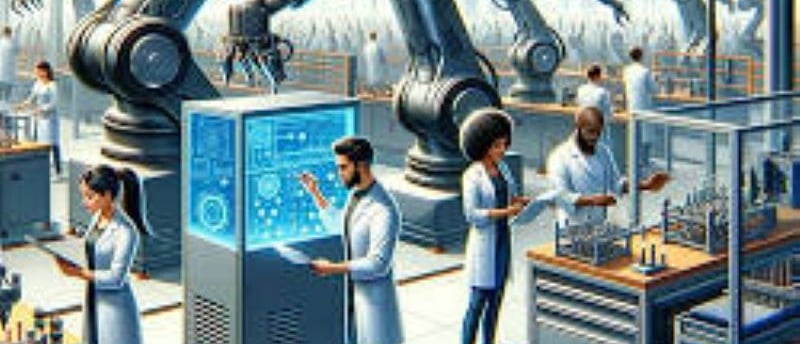Will AI Take Over Human? The Truth About the Future of Artificial Intelligence
AI is evolving at an incredible pace, but will it truly replace human intelligence? In this must-watch video/article, we uncover the real impact of AI on jobs, creativity, and everyday life. Is AI a tool for progress or a threat to humanity?
2/2/20254 min read


Understanding AI and Its Capabilities
Artificial intelligence (AI) refers to the simulation of human intelligence processes by machines, particularly computer systems. This encompasses various capabilities including learning, reasoning, problem-solving, and decision-making. AI technologies can be broadly categorized into two types: narrow AI and general AI. Narrow AI is designed to perform a specific task, such as facial recognition or language translation, whereas general AI aims to understand or learn any intellectual task that a human may perform.
At present, the most widely utilized form of AI is narrow AI, which operates on vast datasets to identify patterns and make predictions. This technology employs machine learning algorithms that improve over time as they are exposed to more data. For instance, in healthcare, AI algorithms analyze medical images to assist in diagnosing diseases, reducing human error and enhancing early detection rates. Similarly, in finance, AI tools are employed for risk assessment and fraud detection, optimizing decision-making processes with high accuracy.
Despite the strengths of AI, such as efficiency and the ability to handle enormous datasets, there are inherent weaknesses that cannot be overlooked. Current AI systems lack genuine understanding or consciousness, often leading to errors when faced with unforeseen scenarios outside their training data. Moreover, ethical considerations arise concerning privacy and data security, particularly when AI technologies are implemented in sensitive sectors like education and healthcare.
As AI continues to evolve, its capabilities in various fields are expanding. Applications now extend beyond traditional domains, incorporating areas such as autonomous vehicles and smart city technologies. Understanding these foundational concepts of AI and its capabilities is crucial as society grapples with the implications of these technologies on various industries and daily life.
The Current State of AI Development
As of 2023, artificial intelligence (AI) continues to evolve at a remarkable rate, driven by advancements in various subfields including machine learning, natural language processing (NLP), and robotics. These advancements are not only reshaping technology but also influencing industries ranging from healthcare to finance. One noteworthy development in machine learning is the emergence of generative models, particularly Generative Adversarial Networks (GANs), which have demonstrated the ability to generate realistic images and audio, thereby pushing the boundaries of creative AI applications.
Natural language processing has seen significant breakthroughs as well, with models like OpenAI’s GPT-4 exhibiting extraordinary capabilities in understanding and generating human-like text. These advancements enable applications such as chatbots and virtual assistants to communicate more effectively and perform complex tasks, enhancing user experiences significantly. Moreover, AI-driven tools are increasingly utilized in sentiment analysis, translation services, and content creation, streamlining various processes and providing substantial efficiency gains.
The robotics sector has also embraced AI, leading to innovative developments in automation. Collaborative robots, or cobots, designed to work alongside humans, are becoming common in manufacturing and logistics. These robots utilize AI algorithms to adapt to their environment, ensuring safer and more efficient operations. Notably, industries such as healthcare are witnessing the integration of AI-powered diagnostic tools that can assist physicians in identifying diseases with improved accuracy.
The role of governments and industries is pivotal in shaping the future of AI development. Significant funding is being allocated towards AI research, with public and private sectors recognizing its potential impact. Ethical considerations regarding AI, including biases in algorithms and accountability, have prompted discussions and the establishment of regulatory frameworks to guide its development responsibly. Ongoing collaboration between stakeholders is essential to foster progress while ensuring that the advancement of AI aligns with societal values and expectations.
Potential Impact of AI on Employment and Society
The integration of artificial intelligence (AI) into various sectors raises crucial questions regarding its impact on employment and society at large. One pressing concern is the potential for job displacement as AI technologies become more capable of performing tasks traditionally carried out by humans. Automation of certain roles can lead to a significant reduction in demand for labor in sectors such as manufacturing, transportation, and even professional services. However, this narrative of job loss may not capture the complete picture.
While AI may displace specific occupations, it also presents opportunities for job creation in fields that require oversight, maintenance, and enhancement of AI systems. The emergence of new roles that focus on collaboration between humans and machines illustrates the potential for AI to complement human skills rather than replace them outright. For instance, jobs involving AI ethics, data analysis, and human-robot interaction are expected to grow. This shift necessitates a rethinking of educational frameworks to equip the workforce with the skills needed in an AI-driven economy.
Beyond employment, the proliferation of AI poses significant social implications. Ethical dilemmas arise when considering how AI systems govern decision-making in critical areas such as healthcare, law enforcement, and finance. Ensuring that AI aligns with human values is paramount to avoid exacerbating existing inequalities or biases. Privacy concerns also play a crucial role, as the deployment of AI in surveillance and data collection can threaten personal freedoms and security if not appropriately regulated.
In summary, while the potential impact of AI on employment and society is multifaceted, its effective integration requires proactive approaches to address job displacement and social challenges. By prioritizing a balanced development that emphasizes ethical considerations and human values, society can harness AI as a tool for enhancing human capabilities rather than a source of disruption.
The Future of AI: Opportunities and Challenges
The future of artificial intelligence (AI) presents a landscape filled with both remarkable opportunities and significant challenges. Experts predict that AI technologies will continue to evolve rapidly, leading to increased efficiency across various sectors such as healthcare, finance, and transportation. For instance, AI-driven solutions can enhance diagnostic accuracy in medical fields or automate financial transactions, thereby streamlining operations and reducing human error.
In addition to operational benefits, AI has the potential to foster innovative problem-solving capabilities. By analyzing vast amounts of data and identifying patterns that human analysts may overlook, AI systems can proffer solutions to complex issues ranging from environmental concerns to global health crises. This enhanced capacity for analysis enables organizations to make more informed decisions, resulting in improved outcomes and strategic growth.
However, as the power of AI expands, so do the risks associated with its use. Notably, the potential for misuse of AI technology raises ethical considerations that must be addressed. From surveillance to autonomous weaponry, there is a growing concern regarding how AI could be deployed for malicious purposes. Furthermore, biases embedded in AI systems—often a reflection of the data on which they are trained—pose a risk of perpetuating discrimination and inequality in decision-making processes.
To navigate these challenges effectively, robust governance structures must be established. Stakeholders, including governments, policymakers, and tech companies, need to collaborate on frameworks that ensure AI is developed and deployed responsibly. This collaborative approach will be crucial in fostering a balanced future where AI thrives alongside human oversight, prioritizing ethical considerations and accountability as foundational pillars of AI advancement. By addressing these opportunities and challenges, society can work toward a future where AI contributes positively to the human experience.
